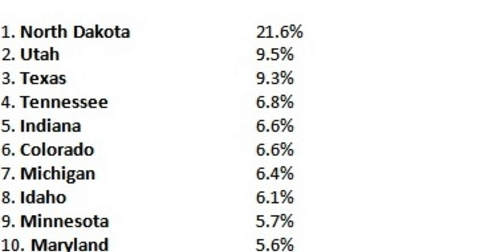Despite Media Claims, Michigan Among Highest Job Growth States
Top jobs producing states are right-to-work
Michigan Radio, a division of NPR, recently highlighted Gov. Rick Snyder’s policies such as right-to-work and cutting business taxes and then described the state’s job growth as "anemic."
"There has been some growth in jobs, but it's been kind of anemic," said Michigan Radio Host Lester Graham in audio posted on the station's website.
However, since the recession ended in June 2009, Michigan has had the sixth-highest job growth in the nation at 6.4 percent, trailing North Dakota at 21.6 percent, Utah at 9.5 percent, Texas at 9.3 percent, Tennessee at 6.8 percent, and Indiana and Colorado, which tied for the fifth spot at 6.6 percent, according to information from the Bureau of Labor Statistics. All of the top seven states except Colorado are right-to-work states*.
Michigan's performance since the end of the recession has been impressive," said James Hohman, assistant director of fiscal policy at Mackinac Center for Public Policy.
Michigan’s unemployment rate was 8.4 percent in May, which was ninth highest in the nation. Nevada led the U.S. with an unemployment rate of 9.5 percent. Michigan’s unemployment rate peaked at 14.2 percent in August 2009 when Jennifer Granholm was governor. When Gov. Snyder took office in January 2011, the state's unemployment rate was 11 percent.
On the Michigan Radio broadcast, Charles Ballard, a professor of economics at Michigan State University, called the state's "Great Recession" the worst of our lifetime and said it wasn't surprising the unemployment rate went up as high as 14.2 percent.
Ballard never used the word "anemic" to describe Michigan’s job growth.
"Thus, I won't comment on that," Ballard said in an email. "I stand by everything I said on the broadcast."
Ballard said Michigan's economic condition is linked to how the entire nation does and that governors get too much blame or credit related to the economy.
Graham didn't respond to a request for comment.
(*Michigan has been a right-to-work state since the end of March. It was noted as a right-to-work state because Michigan Radio reported the state's job growth as "anemic" and related it to the right-to-work law.)
~~~~~
See also:
Majority of Fastest-Growing U.S. Cities Are In Right-to-Work States
Michigan Capitol Confidential is the news source produced by the Mackinac Center for Public Policy. Michigan Capitol Confidential reports with a free-market news perspective.


 Data counter Whitmer’s claim of growing Michigan
Data counter Whitmer’s claim of growing Michigan
 Sen. Stabenow boasts about job growth that mostly reflects recovery from COVID-19 and pandemic policies
Sen. Stabenow boasts about job growth that mostly reflects recovery from COVID-19 and pandemic policies
 COVID cash grew government in Michigan
COVID cash grew government in Michigan
Targeted Incentives Have Gone Too Far
Selecting industries is not the way
Select tax incentive deals are in the news, again.
A new report from the left-leaning national group, "Good Jobs First," lists 240 "megadeals" nationwide over the past few decades and found that Michigan leads the pack with 29; six more than second-place New York.
MLive reporter Melissa Anders noted that this adds up to $7.1 billion worth of incentives and does not include sports stadiums.
Bridge magazine writer Rick Haglund has written a series of recent articles on the state's recent experience with these deals.
Haglund quoted my Mackinac Center colleague Michael LaFaive as well as Gilda Jacobs, president of the Michigan League for Public Policy and former state senator, and Mitch Bean, the retired director of the state House Fiscal Agency. They all mostly pan the expenditures.
"We would be better off if we had a tax policy that reduced the rates and eliminated as many tax expenditures as possible," Bean said.
Select tax incentives and business subsidies are not just bad economics, they are wrong because they encourage government to tilt the playing field toward and against different industries.
There also is a political lesson that Republicans and Democrats should learn: Established politicians have a bias when government tries to target specific industries. That's one of the reasons why the current GOP-majority isn't making much noise about the Michigan Economic Development Corp. right now, whereas Democrats want to eliminate some of the programs now that they are in the minority.
In truth, the game of picking economic winners and losers is bipartisan. It favors some business against the rest, and citizens are the real losers.
Michigan Capitol Confidential is the news source produced by the Mackinac Center for Public Policy. Michigan Capitol Confidential reports with a free-market news perspective.
Want to support our work?
Keep free-market news flowing with your gift to Michigan Capitol Confidential today
Make a gift! Already a supporter
More From CapCon